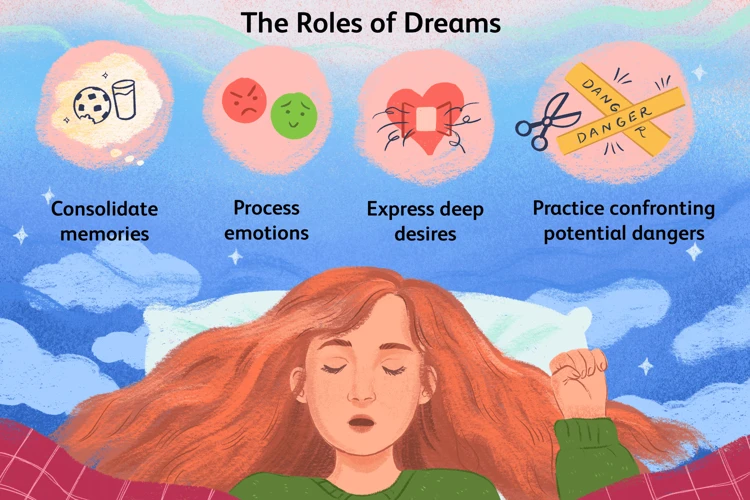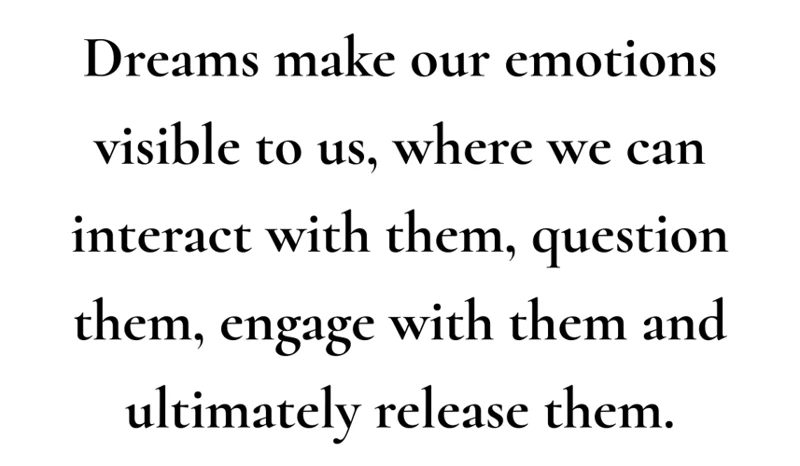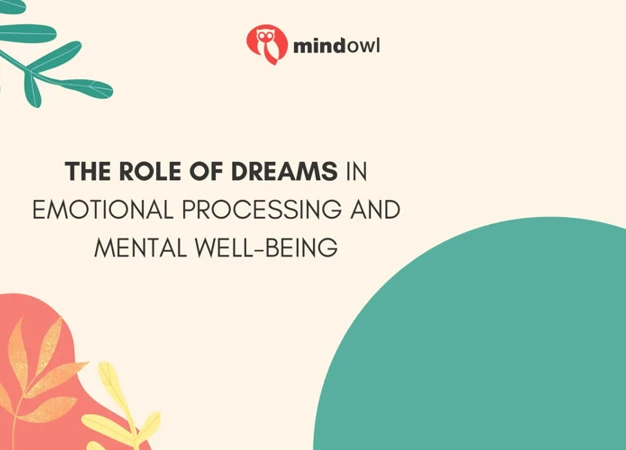Ever found yourself waking up from a dream and wondering what it all means? Recurring dreams, in particular, have a way of capturing our attention and leaving us pondering their significance. These dreams, which revisit us night after night, hold a unique role in the processing of our emotions and memories. They act as gateways into our subconscious mind, providing a glimpse into the depths of our psyche. In this article, we will explore the fascinating world of recurring dreams and delve into their role in emotion processing and memory consolidation. From understanding the connection between emotions and memories to deciphering common themes in recurring dreams, we will uncover the many layers of meaning hidden within these enigmatic nocturnal visions. So, join us on this journey of introspection and discovery as we unlock the secrets of our very own dreamscapes.
The Significance of Recurring Dreams

Recurring dreams hold immense significance in the realm of dream analysis and self-discovery. These dreams have a tendency to repeat themselves over time, often stirring up a sense of curiosity and intrigue in the dreamer. One of the key aspects that sets recurring dreams apart is their ability to capture and communicate important messages from the subconscious mind. These dreams often serve as a symbolic representation of unresolved emotions, deep-rooted fears, or unresolved conflicts. By recurring, they demand our attention and urge us to delve deeper into their hidden meanings. Exploring these symbols and deciphering their significance can provide valuable insights into our waking life experiences and our internal emotional landscape. Additionally, the frequency and intensity of recurring dreams can be influenced by various factors, such as stress levels, developmental stages, and even sleep quality. Understanding these factors can offer further clues to their overall significance. For instance, some studies suggest that the impact of recurring dreams on sleep quality and mental wellbeing can be significant. These dreams may disrupt sleep patterns, leading to daytime fatigue and increased emotional distress. Thus, by unraveling the significance of recurring dreams, we can gain deeper insights into our innermost emotions, fears, and desires, ultimately leading to personal growth and self-awareness.
Processing Emotions through Recurring Dreams

Processing our emotions is a crucial aspect of maintaining emotional well-being, and recurring dreams play a significant role in this process. Our dreams act as a powerful outlet for our unconscious mind to express the thoughts, feelings, and experiences that we may not consciously acknowledge or process in our waking life. When we experience recurring dreams, they often revolve around specific themes, symbols, or scenarios that hold deep emotional significance for us. These dreams serve as a vehicle for us to confront and explore our emotions, allowing us to process and release them in a safe and controlled environment. By revisiting these emotions night after night, recurring dreams provide an opportunity for us to gain a deeper understanding of ourselves and the underlying issues that may be affecting us. By recognizing the symbolism within these dreams and analyzing the emotions they evoke, we can begin to untangle unresolved emotional experiences, heal from past traumas, and develop a greater sense of self-awareness and emotional well-being.
1. Importance of Emotion Processing
Emotion processing plays a crucial role in our psychological well-being and overall mental health. It involves the ability to identify, understand, and manage our emotions effectively. As humans, we experience a wide range of emotions, from joy and love to sadness and anger. It is essential to process these emotions in a healthy manner to prevent them from becoming repressed or suppressed. When emotions are not processed adequately, they can manifest as stress, anxiety, or even physical symptoms such as headaches or digestive issues. Emotion processing allows us to acknowledge and validate our feelings, which is an essential step towards healing and personal growth. It helps us gain a deeper understanding of ourselves, our experiences, and our relationships. By processing emotions, we can effectively release pent-up feelings and move towards resolution and healing. This is where recurring dreams come into play, as they serve as a subconscious tool for emotion processing. These dreams often present symbolic representations of our emotions and allow us to explore them in a safe and non-threatening environment. By revisiting these emotions in our dreams, we have the opportunity to process and integrate them into our conscious awareness. This can lead to a greater sense of emotional balance and overall well-being.
2. How Recurring Dreams Aid in Emotion Processing
Recurring dreams play a crucial role in aiding the processing of emotions within the human psyche. Emotions are complex and multifaceted, and sometimes our conscious mind struggles to fully process and understand them. This is where recurring dreams come in, acting as a conduit for emotion processing and providing a safe space for exploration. These dreams often contain vivid and emotionally charged imagery, allowing us to experience and confront our deepest feelings in a symbolic and metaphorical way. By reliving these emotional scenarios repeatedly, our subconscious mind attempts to make sense of our emotions, integrating them into our overall emotional landscape. Through the symbolism present in recurring dreams, we can gain valuable insights into unresolved emotional issues, fears, and desires that may be hidden within us. These symbols act as a bridge between the conscious and unconscious mind, facilitating the exploration and release of suppressed emotions. By examining the recurring symbols in our dreams, we can begin to understand and address the underlying emotions that may be impacting our waking life. This can lead to a greater sense of self-awareness, emotional healing, and personal growth. The exploration of symbolism in recurring dreams can be a fascinating and revealing process, offering a deeper understanding of our innermost emotions and facilitating the journey towards emotional well-being.
Memory Consolidation in Recurring Dreams

Recurring dreams not only play a significant role in processing emotions but also serve as a powerful mechanism for memory consolidation. Memory consolidation refers to the process of strengthening and organizing memories, allowing them to be stored for long-term retention. During recurring dreams, our subconscious mind revisits past experiences, events, and emotions, creating an ideal environment for the consolidation of memories to take place. These dreams serve as a platform for our brain to process and integrate new information with existing memories, aiding in the formation of cohesive narratives and connections between different aspects of our experiences. Research suggests that REM sleep, the stage in which most dreams occur, plays a crucial role in memory consolidation. Studies have shown that the reactivation of memory traces during REM sleep can enhance their stability and promote the integration of new information. By revisiting memories and experiences in recurring dreams, our mind engages in a process that strengthens and solidifies our recollections, contributing to the overall formation of memories. Understanding the role of memory consolidation in recurring dreams can offer valuable insights into the workings of our brain and the intricate processes involved in memory formation and retention. For more information on symbolism in dream analysis, you can refer to our article on symbolism in recurrent dream symbols.
1. The Role of Memory Consolidation
The role of memory consolidation in recurring dreams is an intriguing aspect of these nocturnal experiences. Memory consolidation refers to the process in which our brain organizes and strengthens memories during sleep. It is during this stage that our brain replays and reactivates the neural connections associated with the memories and experiences we’ve had. This process is crucial for the formation of long-term memories and the integration of new information into our existing knowledge. In the context of recurring dreams, memory consolidation plays a significant role in reinforcing certain memories or emotions that may be linked to the recurring dream theme. For example, if someone repeatedly dreams about a traumatic event, the intense emotions associated with that event can be vividly replayed during the dream. This replaying and processing of emotional memories can aid in the integration of these experiences into our overall understanding of ourselves and the world. Research suggests that emotional memories are more likely to be consolidated during sleep, which may explain why recurring dreams often revolve around emotionally charged themes. Understanding the role of memory consolidation in recurring dreams provides valuable insight into how these dreams help us process and make sense of our emotions and experiences on a deeper level. (Source: factors-influence-frequency-intensity-recurring-dreams)
2. How Recurring Dreams Facilitate Memory Consolidation
Recurring dreams play a vital role in the process of memory consolidation. When we sleep, our brain goes through a series of stages, including REM (Rapid Eye Movement) sleep, which is when dreams occur. During this stage, memories and experiences from our waking life are replayed and integrated into our long-term memory storage. Recurring dreams provide a unique opportunity for the brain to repeatedly revisit and process specific memories or emotional experiences. This repetitive process allows for more efficient consolidation of information into our memory banks. Research suggests that recurring dreams can enhance memory consolidation by strengthening neural connections associated with the memories or emotions being re-experienced. The reactivation of these neural pathways during dream states aids in strengthening the memory traces associated with the dream content. The heightened emotional intensity often experienced in recurring dreams can contribute to the solidification of memories. The emotional arousal acts as a form of signaling to the brain that the memory being replayed is of significance, which prompts a deeper level of consolidation. It is worth noting that the impact of recurring dreams on memory consolidation may also be influenced by factors such as sleep quality and mental wellbeing. Poor sleep quality, which can be caused by recurring dreams, may disrupt the normal memory consolidation process, leading to potential memory fragmentation or impairments. Understanding the role of recurring dreams in memory consolidation not only sheds light on the fascinating workings of our brain during sleep but also highlights the potential impact of these dreams on our overall cognitive functioning. To delve further into the relationship between recurring dreams and sleep quality, you can refer to a related article on the impact of recurring dreams on sleep quality and mental wellbeing.
The Connection Between Emotions and Memories in Recurring Dreams

In the realm of recurring dreams, the connection between emotions and memories plays a profound role. Emotionally charged memories have a way of resurfacing in these dreams, inviting us to revisit past experiences and explore the emotions associated with them. These memories can include both positive and negative events, ranging from moments of joy and love to instances of fear and trauma. Recurring dreams act as a unique platform for us to process and make sense of these emotional memories. They allow us to confront and re-experience our emotions in a safe and controlled environment, offering an opportunity for healing and resolution. By immersing ourselves in the emotions depicted in these dreams, we can gain a deeper understanding of their impact on our subconscious mind and overall well-being. These dreams serve as a bridge between our conscious and unconscious selves, offering valuable insights into the complex tapestry of our emotions and memories.
1. Emotionally Charged Memories
- Emotionally Charged Memories: One significant aspect of recurring dreams is their connection to emotionally charged memories. Our subconscious mind tends to hold onto experiences that have evoked strong emotions, whether positive or negative. These memories often carry a heightened emotional weight and can influence our thoughts, feelings, and behaviors in our waking life. Recurring dreams provide a platform for these emotionally charged memories to resurface and be processed. These memories may include a wide range of experiences, such as traumas, past relationships, or significant life events. They can elicit intense emotions, such as fear, sadness, joy, or anger.
2. The Role of Recurring Dreams in Revisiting Emotionally Charged Memories
Recurring dreams not only help process emotions but also serve as a vehicle for revisiting emotionally charged memories. Our minds possess a remarkable ability to store and recall past events that had a significant emotional impact on us. These memories are often deeply buried within our subconscious, and without proper acknowledgement and exploration, they may continue to influence our thoughts, feelings, and behaviors. Here, recurring dreams play a vital role by bringing these memories to the forefront of our consciousness.
When we experience recurring dreams that involve emotionally charged memories, it signifies that there is still unfinished business related to those past events. These dreams serve as an invitation to revisit and confront these memories, providing an opportunity for healing and resolution. Through the vivid and immersive nature of dreams, we can experience these memories in a safe and controlled environment.
During recurring dreams, we may find ourselves reliving past traumas, conflicts, or intense emotional situations. These dreams allow us to process and integrate the associated emotions, enabling us to gain a deeper understanding of our reactions and coping mechanisms. They offer a chance to confront any unresolved pain, fear, or guilt that may surround these memories.
By revisiting emotionally charged memories in recurring dreams, we can often gain a fresh perspective on the past. These dreams provide an opportunity to reflect on our actions, choices, and the impact they had on ourselves and others involved. This process can bring about a sense of emotional release and closure, helping us to let go of any lingering negative emotions associated with these memories.
It is essential to approach these dreams with a sense of curiosity and willingness to explore our emotions. By paying attention to the details and emotions within the recurring dreams, we can unravel the hidden messages and insights they hold. Engaging in techniques such as dream journaling and reflection can aid in the interpretation and understanding of these emotionally charged memories within our recurring dreams.
Recurring dreams serve a vital role in revisiting emotionally charged memories. By providing a safe space for exploration and processing, these dreams allow us to confront unresolved emotions, gain insights into our reactions, and bring about healing and closure. Embracing the role of recurring dreams in revisiting emotionally charged memories can lead to personal growth, self-awareness, and ultimately, a greater sense of emotional well-being.
The Psychological Interpretation of Recurring Dreams

Recurring dreams have long fascinated psychologists and researchers, who believe that these dreams provide a window into our subconscious mind and can reveal valuable insights into our psychological state. One common interpretation is that recurring dreams reflect unresolved conflicts or unresolved emotions buried deep within the psyche. These dreams act as a means of processing these unresolved issues, attempting to bring them to the forefront of our awareness. For example, a recurring dream of being chased may symbolize feelings of anxiety or a sense of being pursued by something in our waking life that we have not yet addressed. By analyzing the symbolism and themes present in recurring dreams, psychologists can gain a deeper understanding of the underlying emotions and experiences that may be influencing our waking behaviors and thoughts. Additionally, recurring dreams can also be seen as a manifestation of our mind’s attempt to problem-solve and find solutions to ongoing challenges. They may present scenarios or symbols that reflect our subconscious attempts to work through difficulties and find resolution. Through the use of techniques such as dream analysis, therapists can help individuals uncover the hidden meanings within recurring dreams and explore their potential psychological significance. This process can lead to increased self-awareness, personal growth, and a deeper understanding of one’s own emotional and mental well-being.
Common Themes in Recurring Dreams and Their Emotional Significance

Common themes in recurring dreams are often filled with rich symbolism and carry profound emotional significance. These recurring motifs can vary widely, but certain themes tend to appear more frequently in people’s dreams. One such theme is being chased, which can symbolize feelings of fear, anxiety, or a sense of being pursued by unresolved emotions or situations in waking life. Another common recurring theme is falling, which often represents a loss of control, insecurities, or a fear of failure. Another prevalent theme is being naked in public, which can point to vulnerability, exposure, or a fear of being judged. Other recurring dream themes include being unable to move or speak, being late or missing an important event, or teeth falling out. Each of these themes carries its own emotional significance and may reflect underlying fears, insecurities, or unresolved issues. It is crucial to interpret these themes within the context of the dreamer’s personal experiences and emotions. While these themes may seem unsettling or confusing, they provide a unique opportunity for self-reflection and growth. By exploring the emotional significance of these recurring dream themes, individuals can gain a deeper understanding of their fears, anxieties, and unresolved emotions, and work towards finding resolution and healing in their waking lives.
Methods to Engage and Process Recurring Dreams

When it comes to engaging with and processing recurring dreams, there are several effective methods that can help unlock their hidden meanings and tap into their transformative potential. One method is to keep a dream journal, where you record your dreams immediately upon waking up. This allows you to capture vivid details and emotions that may fade throughout the day. Through journaling, patterns and themes may emerge, providing valuable insights into the recurring aspects of your dreams. Another method is reflection and analysis. Take the time to ponder over the symbols, themes, and emotions present in your recurring dreams. Ask yourself questions like “What does this symbol represent to me?” or “What emotions does this dream evoke?” This introspection can lead to a deeper understanding of the subconscious messages conveyed in your dreams. Additionally, seeking professional help, such as seeing a therapist or dream analyst, can provide expert guidance and interpretation. They can offer a fresh perspective and facilitate a deeper exploration of recurring dreams. Engaging with these methods empowers individuals to actively participate in the process of uncovering the significance of their recurring dreams and harnessing their transformative power.
1. Dream Journaling
Dream journaling is a powerful tool for engaging and processing recurring dreams. It involves keeping a journal or notebook by your bedside and recording your dreams as soon as you wake up. This practice serves multiple purposes. Firstly, it helps capture the details of the dream while they are still fresh in your mind, preventing them from fading away as you go about your day. By documenting your dreams, you create a written record that can be revisited and analyzed later. This process allows you to identify patterns, symbols, and emotions that may be recurring in your dreams. It provides a safe space for expressing and exploring your feelings associated with the dream. Through dream journaling, you can develop a deeper understanding of the messages and themes that your subconscious mind is trying to communicate. By reflecting on your recorded dreams, you may notice connections between your dreams and your waking life experiences, leading to valuable insights and personal growth. Dream journaling can also assist in recognizing any unresolved emotions or conflicts, providing an opportunity for introspection and healing. Engaging in this practice consistently can lead to a greater sense of self-awareness, improved dream recall, and a richer understanding of the significance behind your recurring dreams.
2. Reflection and Analysis
Engaging in reflection and analysis is a powerful method for understanding and interpreting recurring dreams. When it comes to these persistent dreams, it is crucial to spend time reflecting on their content, symbolism, and emotional impact. One effective approach is to maintain a dream journal, where you can record your dreams upon waking, capturing as much detail as possible. This practice allows you to revisit your dreams later and analyze patterns or recurring themes that emerge. When reflecting on your recurring dreams, pay attention to the emotions they evoke and their connection to your waking life experiences. This self-reflection can provide valuable insights regarding unresolved emotions, desires, or fears that may be playing out in your dreams. Additionally, exploring the symbolism within your dreams can deepen your understanding of their significance. Symbols may vary from person to person, so it is essential to consider personal associations and cultural influences. A helpful technique is to create a list or table of recurring symbols or themes in your dreams, accompanied by their potential meanings and how they relate to your waking life. This process of reflection and analysis can foster self-awareness, aiding in the interpretation of recurring dreams and illuminating the deeper layers of your subconscious mind.
3. Seeking Professional Help
When recurring dreams persist and begin to significantly impact our daily lives, seeking professional help can be a valuable step towards understanding their deeper meaning and finding resolution. Consulting a qualified therapist or dream analyst can provide a supportive and structured environment to explore recurring dreams in a safe and non-judgmental space. These professionals possess the expertise to guide individuals through the intricate landscape of dream analysis, helping us uncover the hidden messages and emotions embedded within recurring dreams.
A professional dream analyst can employ various techniques and approaches to interpret the symbolism and themes in recurring dreams. They may use Jungian analysis, which focuses on the collective unconscious and archetypal symbols, or they may draw from other schools of thought and therapeutic modalities. Their expertise allows them to help us explore the underlying emotions and unresolved conflicts that may be manifesting in our recurring dreams.
By working with a professional, individuals can gain a deeper understanding of the recurring dream’s emotional significance and its connection to their waking life experiences. Therapists may guide clients in exploring the symbolism, emotions, and narratives within the dreams, encouraging active engagement and personal reflection. Through this process, individuals can gain valuable insights into their thought patterns, beliefs, and inner conflicts, paving the way for personal growth and resolution.
It is important to note that seeking professional help does not diminish the value or validity of one’s personal interpretations and experiences with recurring dreams. Rather, it offers an additional layer of understanding and support from an objective perspective. Professional dream analysis can provide a structured framework for exploring recurring dreams, assisting in the integration of their messages into our waking lives, and facilitating personal transformation.
Understanding the Subconscious Mind through Recurring Dreams
Understanding the subconscious mind is a complex and fascinating endeavor, and recurring dreams provide a unique window into this enigmatic realm. Our subconscious mind holds a vast reservoir of thoughts, emotions, and memories that may not always surface in our waking consciousness. Recurring dreams act as a bridge between our conscious and subconscious states, allowing us to witness and explore the underlying layers of our psyche. These dreams often contain symbols, scenarios, or themes that hold deep personal significance and meaning. By paying close attention to the recurring elements in our dreams, we can begin to unravel the hidden messages and insights they hold. These dreams can provide clues about unresolved issues, unexpressed desires, or suppressed emotions that may be influencing our thoughts and behaviors in daily life. They allow us to tap into the deeper aspects of ourselves, bringing to light what may have been buried or ignored. Recurring dreams offer an opportunity for self-reflection and self-discovery. By exploring and interpreting the recurring symbols and themes, we can gain a better understanding of ourselves, our motivations, and our innermost desires. This increased self-awareness can lead to personal growth, healing, and transformation. So, let us embark on this journey of self-exploration and dive deep into the vast realm of our subconscious through the lens of recurring dreams.
Conclusion
In conclusion, recurring dreams play a vital role in the processing of emotions and memories. These dreams serve as a doorway to our subconscious mind, allowing us to explore and understand our deepest emotions, fears, and desires. By revisiting emotionally charged memories, recurring dreams offer an opportunity for us to process and make sense of our past experiences. They facilitate the consolidation of memories, allowing us to integrate new information and emotions into our existing mental framework. Moreover, recurring dreams provide valuable insights into the connection between emotions and memories, unraveling the complex web of our psychological landscape. By understanding the psychological interpretation of these dreams and identifying common themes, we can gain a deeper understanding of ourselves and our inner world. Engaging with recurring dreams through methods like dream journaling, reflection, and seeking professional help can further enhance the exploration and processing of these dreams. Ultimately, recurring dreams provide a unique and powerful tool for self-discovery, personal growth, and unlocking the mysteries of our subconscious mind.
Frequently Asked Questions
1. How common are recurring dreams?
Recurring dreams are quite common, with approximately 60-75% of adults reporting that they have experienced them at some point in their lives.
2. Why do recurring dreams happen?
Recurring dreams can occur due to a variety of reasons such as unresolved emotions, unresolved conflicts, trauma, or repetitive patterns in our waking life. They serve as a way for our subconscious mind to bring attention to these important aspects of our lives.
3. Can recurring dreams have different meanings for different people?
Absolutely! The meaning of recurring dreams can vary from person to person. While there may be common themes, symbols, or emotions associated with certain dreams, the interpretation is highly personal and influenced by an individual’s unique experiences and emotions.
4. Are recurring dreams always negative or scary?
No, recurring dreams can have a range of emotions associated with them. While some recurring dreams may be unsettling or evoke fear, others can be neutral, positive, or even joyful. It ultimately depends on the individual and the specific content of the dream.
5. Can recurring dreams help us solve problems in our waking life?
Yes, recurring dreams can offer valuable insights into our waking life challenges. By exploring and analyzing the symbols, emotions, and themes within these dreams, we can gain a new perspective on our problems and potentially find solutions or resolutions.
6. Can recurring dreams be influenced by our daily experiences?
Absolutely! Our daily experiences, thoughts, and emotions can seep into our dreams, including recurring ones. The content and themes of these dreams may be influenced by our current situations, relationships, or stressors.
7. Do recurring dreams ever stop on their own?
Recurring dreams can often stop on their own. They may simply fade away as our subconscious mind processes and resolves the underlying emotions or conflicts. However, if the recurring dreams persist and cause distress, it may be helpful to explore their meanings further with the help of a therapist or dream analyst.
8. Can recurring dreams affect our overall well-being?
Yes, recurring dreams can potentially impact our overall well-being. If the dreams are intense or disturbing, they may affect the quality of our sleep and lead to daytime fatigue, anxiety, or emotional distress. Addressing these dreams and their underlying causes can contribute to improved mental and emotional well-being.
9. Is it possible to change the outcome of a recurring dream?
While we may not have direct control over the specific outcomes of recurring dreams, we can influence their meanings and how they affect us. By engaging in dream analysis, therapy, or personal reflection, we can gain a better understanding of the dreams and potentially shift our emotional responses or perspectives associated with them.
10. Can recurring dreams reveal hidden aspects of ourselves?
Yes, recurring dreams have the potential to reveal hidden aspects of ourselves, including unexpressed emotions, unresolved conflicts, or even untapped potential. They provide a window into our subconscious mind, offering insights into our deepest desires, fears, and aspirations.








